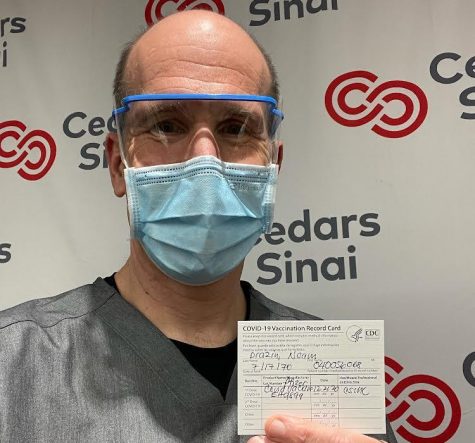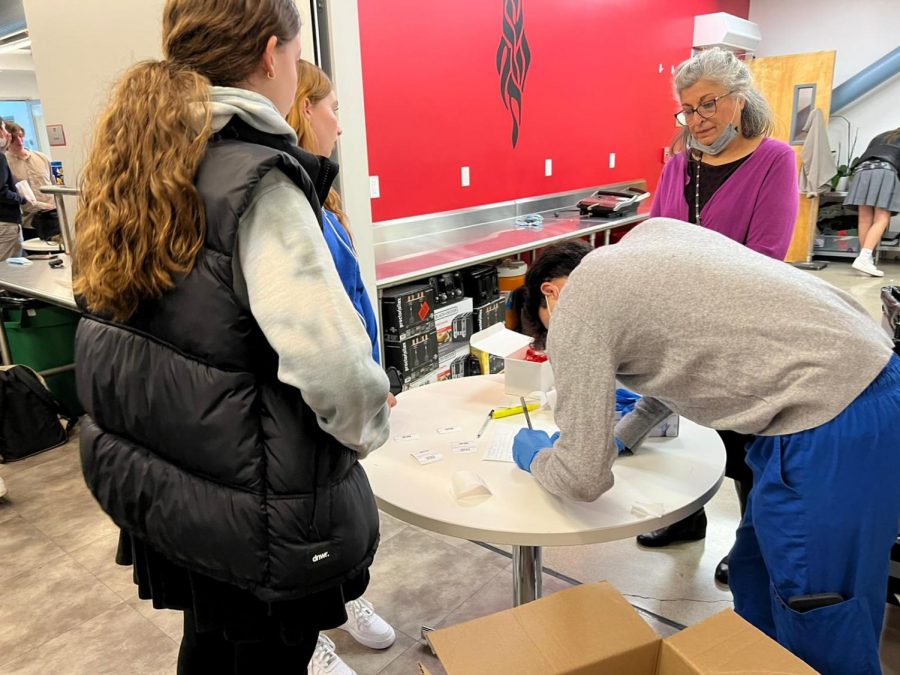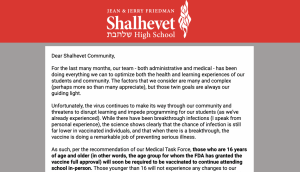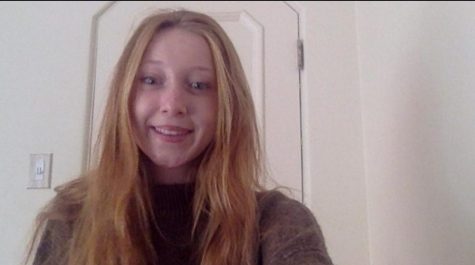Vaccine mandate takes effect for most students 16 and up
Mandate also covers faculty and staff, some ‘religious exemptions’ are allowed
SWAB: Arielle Grossman and Keira Deutsch wait for their Covid test in the cafeteria Dec. 3 as Director of Facilities Lili Einalhori oversees. Weekly Covid testing is required for unvaccinated students and members of the basketball team, and also available for any student who wishes.
December 3, 2021
As of Nov. 30, all Shalhevet students 16 and up, as well as faculty and staff, must be fully vaccinated against Covid-19 in order to attend in-person school, or they will have to attend class via Zoom.
The mandate took effect Nov. 30. It was first announced Oct. 13. Shalhevet board president Dr. Noam Drazin said the decision was made for both health and religious reasons.
“We are doing what we can to improve the health and safety of our students, of our faculty, and of the greater community beyond,” said Dr. Drazin, who is also leader of the school’s Medical Task Force. “And I feel we continue to be a light unto others in the community — and we think this move is appropriate in alignment with our values as a school, as an institution, and very much in alignment with Torah values.”
However, the school is also allowing exemptions and it is unclear how many students and staff remain on campus and unvaccinated.

“It’s a mandate — it is not an absolute forcing vaccinations on people,” Dr. Drazin said in an interview Oct. 15. “They still have the ability to apply for medical exemption, potential religious exemptions and or personal belief exemptions, which we will be addressing on a case-by-case basis.”
Head of School Rabbi David Block declined to share how many students have received them and said there was no one definition of a Jewish religious exemption.
“I consider the context, the myriad of details, and complexities that are unique to each and every case,” Rabbi Block said in voice-message answers to Boiling Point questions yesterday. “It is certainly not true that every request is blatantly granted.”
Still, the mandate makes Shalhevet the only Orthodox high school in Los Angeles that requires the Covid vaccine at all. Dr. Drazin said school officials reached out to YULA’s Covid task force in hopes of finding a joint approach.
“We thought it would allow more community alignment to have both schools in a community to be on the same page with regard to this matter,” said Dr. Drazin. “And it was made clear to us that although they felt that what we were doing was a good idea, they weren’t in a position to do that.”
But he was confident about the religious reasoning.
“I think we have some very strong opinions from a halachic perspective that suggest that this is the right thing to do,” Dr. Drazin said. “We are the only Modern Orthodox school [in Los Angeles] that decided to do that at this time, and we feel very strongly and proud to be able to do that.”
Although the vaccine has now been approved for children as young as 5 — and since May for children ages 12 – 15 — as of now, only students 16 and up are affected by the mandate. Officials said that is because for this age group the vaccine has been given full FDA approval, whereas for the younger groups the vaccines are approved for “emergency use.”
Once the vaccine receives full approval for ages 12-15, a mandate for them will be revisited, Rabbi Block said. In the meantime, those who are unvaccinated and under 16 will still be required to Covid test weekly.
Rabbi Block said there were two major halachic considerations that guided Shalhevet’s decision to mandate vaccines, considerations he discussed with meetings with Shalhevet’s posek (halachic advisor), Rabbi Jeremy Weider. Rabbi Weider is Rosh Yeshiva of the Rabbi Isaac Elchanan Theological Seminary (RIETS) at Yeshiva University in New York.
“One is the idea of pikuach nefesh, as it says in the Torah that we have to protect our own lives and our own health,” Rabbi Block told the Boiling Point. “There’s a second piece … our obligation to protect our community and the people around us. That means that we have to do everything we can to ensure that the safety of others is not in danger.
“That is not only a Jewish value but it is a halachic value,” he added.
In addition, since not everyone in our community is protected against the virus, protecting them through vaccinating ourselves falls under the larger halachic category of “not standing idly by a friend’s blood,” from Vayikra Chapter 19, verse 16, he said.
“People go home,” Rabbi Block said. “It could be our students, it could be our teachers, who go home to young children who are not able to get the vaccine, who go home to people who are immunocompromised, who go home to people that are elderly.”
When the mandate was announced, Rabbi Block wrote two lengthy emails to the community about the new policy, along with an email to unvaccinated families.
“Unfortunately, the virus continues to make its way through our community and threatens to disrupt learning and impede programming for our students,” Rabbi Block wrote to the wider Shalhevet community Oct. 13.
“While there have been breakthrough infections, the science shows clearly that the chance of infection is still far lower in vaccinated individuals,” he continued, “and that when there is a breakthrough, the vaccine is doing a remarkable job of preventing serious illness.”
Later in October, he sent out a letter to unvaccinated families describing how to obtain a medical or religious exemption to the mandate.
“Religious exemptions should not be generic letters but a simple personal letter from your Rabbi suffices,” Rabbi Block wrote in the email, which was obtained by the Boiling Point. “Additionally, medical exemption from your doctor may include status of natural immunity as indicated by your physician.”
Dr. Drazin said unvaccinated students without exemptions would be prevented from attending certain activities.
“If this is an unvaccinated student who does not have an exemption then yes the expectation is that, no, you will not be able to do anything on campus or or go on any trips,” Dr. Drazin said.
When announced, the new policy gave unvaccinated students a six-week window to become fully vaccinated. Students not yet 16 will be given six weeks from their 16th birthdays.
Students who have contracted Covid within the last 90 days will be required to vaccinate after the three-month time frame passes. Natural immunity is not a substitute for the vaccine under this mandate.
Dr. Drazin said officials decided to require the vaccine after months of trying to convince people through explanations and reassurances from science.
“We really did try to try to move the needle, in a way, through education, and it just didn’t work,” Drazin told the Boiling Point in an interview on Oct. 15.
He said some but not all parents were persuaded — some when their children had to stay home because of Covid exposures. Still, he said, “there weren’t enough.
“In the end, there was still a significant number of students that were unvaccinated and parents who felt that they wanted to keep them unvaccinated,” he said.
Shalhevet also wanted to respect the pro-vaccination opinion that many Shalhevet families hold.
“The original thought process around the vaccine mandate was that we wanted to respect the opinions of what appears to be a significant population of people at our school,” Drazin said.
Additionally, Dr. Drazin and another medical task force member, Dr. Steven Kupferman, called unvaccinated families the night before it was announced so that the mandate would not come as a surprise to them.
“The reason was to give them a heads up,” Dr. Drazin said. “It wasn’t to convince them. It wasn’t to poll them on whether or not they’re going to get a vaccine. It wasn’t to bully them. It was to tell them and give them a heads up that this was coming. “And for the most part, I will tell you, I would say the majority who I spoke to were appreciative of the heads up as a courtesy.”
Reaction has been mixed, school officials said, with a strong majority of parents favoring the mandate, while a passionate minority is opposed.
One Shalhevet student said she was vaccinated but still opposed the requirement. She asked that her name not be used.
“It feels as if the school is disrespecting the students’ free will,” she said on Nov. 28. “If people don’t believe getting vaccinated is self-beneficial, it shouldn’t be forced by a community they call home.”
Dr. Drazin said that was a minority but loudly stated view.
“The majority of the student population who is vaccinated, because as of now I believe 75 – 76% is vaccinated, is extremely happy and grateful that we made that mandatory,” Dr. Drazin said.
“The minority of parents who are parents of unvaccinated students have been, although they’re the minority, extremely vocal and some angry with the decision.”
Rabbi Block said criticism over the mandate has led to larger claims against Shalhevet. In an email sent out to the Shalhevet community on Nov. 13, he said some community members are questioning the religious identity of the school, claiming that Shalhevet is no longer Modern Orthodox.
“I don’t actually believe that the friction is a result of the mandate itself,” Rabbi Block said in the email. “The mandate seemed to have been a catalyst for something much bigger.”
He said the topic of vaccines had become politicized, “And that’s true in the religious community, too.
“The other local schools who have had any sort of requirement are not Orthodox,” Rabbi Block wrote. “So, in the heads of some, requiring vaccines must align us with the non-Orthodox and distance us from the Orthodox community.”
Rabbi Block wrote that Shalhevet is indeed a Modern Orthodox institution and encouraged the community to be more thoughtful and not jump to false conclusions.
“There’s an alternative,” he wrote. “Instead of having our decisions made for us by our label of choice, we can thoughtfully consider each individual issue on its own and make the best decision for that particular issue.”
He referred to this approach as “Thoughtful Modern Orthodoxy.”
“I know well that no decision will make everyone happy (nor is it ever our guiding light),” Rabbi Block said. “I must say, though, that as a school that deeply values diversity and multiplicity of perspectives, it pains me to see the divisiveness that COVID and its policies have created. My job is always – always – to make sure we are providing the very best education for our students, and I urge us to keep our eyes on the proverbial ball.”















